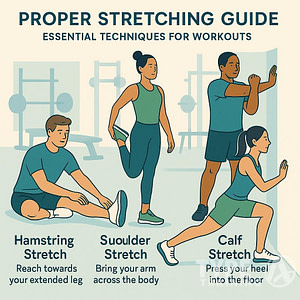Many people reach for their coffee as soon as they wake up, seeking that immediate caffeine boost. But is this the best approach?
Dr. Andrew Huberman, a renowned neuroscientist, suggests otherwise. According to Huberman’s “90-Minute Rule,” waiting 90-120 minutes after waking before consuming caffeine can significantly enhance your energy levels and overall well-being.
The science behind this rule is rooted in our body’s natural circadian rhythm and cortisol production.
Popular posts:
When you wake up, your body naturally releases cortisol, a hormone that helps you feel alert and energized. By delaying your coffee intake, you allow this natural process to take place without interference, potentially leading to improved focus and sustained energy throughout the day.
Implementing this rule might seem challenging at first, but the potential benefits make it worth considering. You may find that by aligning your caffeine consumption with your body’s natural rhythms, you can optimize your productivity and avoid the dreaded afternoon crash.
Key Takeaways
- Wait 90-120 minutes after waking before drinking coffee for optimal energy levels.
- This timing aligns with your body’s natural cortisol production and circadian rhythm.
- Adjusting your coffee routine may lead to improved focus and sustained energy throughout the day.
Understanding the Science of Caffeine and Sleep
Caffeine interacts with your brain’s chemistry to influence your sleep-wake cycle and alertness. Its effects on adenosine receptors and cortisol levels play crucial roles in how you experience wakefulness and sleep quality.
Effects of Caffeine on the Brain
Caffeine acts as a stimulant by blocking adenosine receptors in your brain. Adenosine is a neurotransmitter that builds up throughout the day, making you feel sleepy.
When caffeine binds to these receptors, it prevents adenosine from attaching, keeping you alert and awake.
This mechanism can disrupt your natural sleep-wake cycle if consumed too close to bedtime. Caffeine has a half-life of about 5-6 hours, meaning half of it remains in your system after this time.
To maintain healthy sleep patterns, it’s recommended to avoid caffeine intake 8-12 hours before your usual bedtime.
The Role of Adenosine in Sleep Quality
Adenosine plays a vital role in regulating your sleep quality. As you go about your day, adenosine levels in your brain gradually increase, promoting sleepiness.
During sleep, adenosine levels naturally decrease. This process is essential for maintaining your sleep architecture – the pattern and stages of sleep you experience throughout the night.
When you consume caffeine, it interferes with this natural process. While it may help you stay awake, it can also lead to poorer sleep quality if consumed too late in the day.
To optimize your sleep, it’s crucial to allow adenosine levels to rise naturally in the evening, signaling to your body that it’s time to rest.
Cortisol and Its Impact on Wakefulness
Cortisol, often called the “stress hormone,” plays a significant role in your natural wakefulness. Your body follows a cortisol awakening response, with levels peaking about 30-45 minutes after waking.
This natural cortisol surge helps you feel alert and energized in the morning. Consuming caffeine during this peak can interfere with your body’s natural wake-up process and potentially lead to increased tolerance to caffeine’s effects.
By waiting 90-120 minutes after waking to have your coffee, you allow your natural cortisol levels to peak and begin declining. This timing can help you maximize the benefits of both your body’s natural wakefulness and the stimulating effects of caffeine.
The Optimal Timing for Your Morning Coffee
Timing your morning coffee can significantly impact your energy levels and focus throughout the day. The 90-minute rule provides a science-based approach to maximize caffeine’s benefits.
Aligning Coffee Intake with the Circadian Rhythm
Your body follows a natural 24-hour cycle called the circadian rhythm. This rhythm influences hormone production, including cortisol, which helps you feel alert. Cortisol levels naturally peak 30-45 minutes after waking, gradually declining thereafter.
By waiting 90-120 minutes after waking to drink coffee, you allow your body’s natural cortisol spike to occur uninterrupted. This timing aligns your caffeine intake with the natural dip in cortisol, enhancing its effects.
Consuming caffeine too early can interfere with your body’s natural wake-up process, potentially leading to increased caffeine tolerance over time.
How the 90-Minute Rule Enhances Alertness
The 90-minute rule, proposed by Dr. Andrew Huberman, aims to optimize your coffee consumption for maximum alertness. By delaying your morning coffee, you:
- Allow natural cortisol to peak
- Avoid caffeine interference with cortisol production
- Enhance caffeine’s effects during the mid-morning cortisol dip
This timing strategy can lead to improved focus, energy, and cognitive function throughout the day. You may find yourself feeling more alert and productive without needing to increase your caffeine intake.
Mitigating Caffeine Dependency
Following the 90-minute rule can help reduce your reliance on caffeine for wakefulness. By allowing your body’s natural wake-up mechanisms to function unimpeded, you may experience:
- More consistent energy levels throughout the day
- Reduced caffeine tolerance over time
- Improved sleep quality
To further mitigate caffeine dependency, consider stopping caffeine consumption 8-12 hours before bedtime. This practice helps ensure caffeine doesn’t interfere with your sleep cycle, promoting better overall rest and reducing the need for caffeine the next morning.
Practical Tips for Implementing the 90-Minute Rule
To successfully adopt the 90-Minute Rule for coffee consumption, try these practical strategies:
Set a timer for 90 minutes after waking up. This simple step helps you track the optimal time for your first cup of coffee.
Prepare your coffee maker the night before. Having everything ready allows you to brew quickly when the time comes.
Engage in other morning activities to boost your alertness:
- Expose yourself to natural light
- Take a cold shower
- Do light exercises or stretches
These activities can help increase your energy levels naturally while you wait.
Consider alternatives like herbal tea or water with lemon during the 90-minute period. These can provide hydration without interfering with your body’s natural cortisol rhythm.
Gradually adjust your routine. If you’re used to immediate coffee, start by waiting 30 minutes, then 60, before reaching the full 90 minutes.
Plan your most important tasks for after your coffee. This aligns your peak caffeine-induced focus with your most demanding work.
Remember, consistency is key. Stick to the 90-Minute Rule daily, including weekends, to maximize its benefits for your energy and concentration.
Additional Considerations for Coffee Consumption
Optimizing your coffee consumption involves more than just timing. It’s essential to consider how caffeine interacts with other beverages and how your diet and lifestyle affect your energy levels.
Balancing Caffeine Intake with Other Beverages
Your coffee habits can impact the effects of other drinks you consume. Hydration is crucial for cognitive function, so balance your caffeine intake with water. Aim to drink a glass of water before your morning coffee.
Consider alternating coffee with herbal teas throughout the day. This can help maintain steady energy levels without overloading on caffeine.
Be mindful of afternoon caffeine consumption. Switch to decaf or herbal options after 2 PM to avoid disrupting your sleep cycle.
Dietary and Lifestyle Factors Affecting Energy Levels
Your diet plays a significant role in your energy levels and how you respond to caffeine. Eating a balanced breakfast before your morning coffee can help stabilize blood sugar and enhance caffeine’s effects.
Regular exercise can improve your overall energy levels and cognitive function. Try incorporating a morning workout before your coffee for an added boost.
Prioritize quality sleep to maximize the benefits of caffeine. Aim for 7-9 hours of sleep per night to support your body’s natural energy rhythms.
Consider your individual caffeine sensitivity. Some people may need to limit their intake to maintain optimal energy levels and well-being.
Frequently Asked Questions
Dr. Andrew Huberman’s 90-minute coffee rule has sparked interest and questions among caffeine enthusiasts. This timing strategy aims to optimize energy levels and cognitive function throughout the day.
What are the benefits of waiting 90 minutes after waking to drink coffee?
Waiting 90 minutes allows your body’s natural cortisol levels to peak. This enhances focus and energy without relying on caffeine immediately.
You may experience more sustained alertness and avoid the mid-afternoon crash.
How does consuming coffee 90 minutes post-awake time affect adenosine levels?
By delaying caffeine intake, you avoid blocking adenosine receptors too early in the day. This helps maintain a more natural sleep-wake cycle.
Your body can better process adenosine, the chemical associated with sleepiness, throughout the day.
What scientific evidence supports the 90-minute coffee rule suggested by Dr. Andrew Huberman?
Dr. Huberman bases his recommendation on research about circadian rhythms and cortisol production.
Studies show that cortisol levels naturally peak about 30-45 minutes after waking. Waiting 90 minutes aligns caffeine intake with your body’s natural rhythm.
Why does Dr. Huberman advise against drinking coffee immediately after waking up?
Consuming caffeine right after waking can interfere with your body’s natural cortisol spike. This may lead to increased caffeine tolerance and reduced effectiveness.
It can also disrupt your natural energy patterns throughout the day.
Can delaying your morning coffee improve its effectiveness throughout the day?
Yes, waiting 90-120 minutes can enhance coffee’s impact on your alertness and focus.
By aligning caffeine intake with your body’s natural rhythms, you may experience more consistent energy levels and improved cognitive function.
What is the recommended time to stop consuming caffeine prior to sleep for optimal rest?
Dr. Huberman suggests stopping caffeine intake 8-10 hours before bedtime. This allows enough time for your body to metabolize the caffeine. Following this guideline can help improve your sleep quality and make it easier to fall asleep at night.











